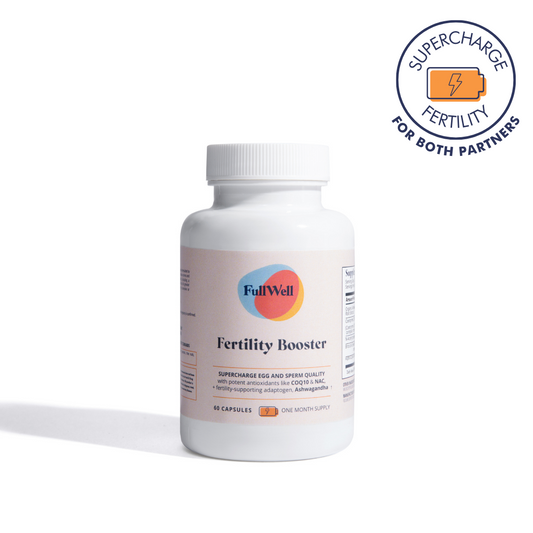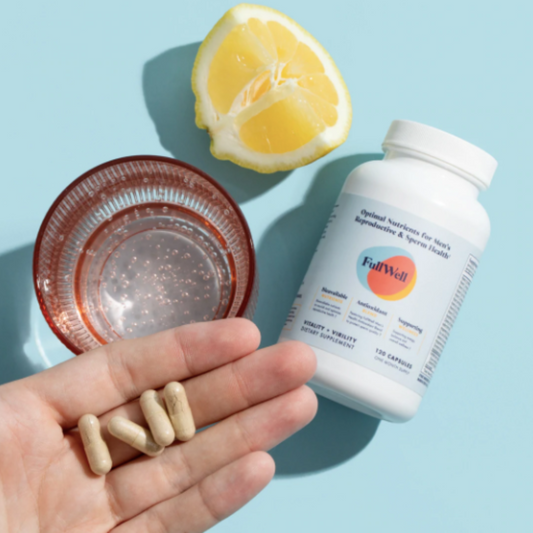Joyful Journeys: Stories of Preconception
Read more

Women’s health and fertility are incredibly important topics that I discussed almost daily with clients in my private practice who were trying to conceive. When conception isn’t achieved on a couple’s expected timetable, the notion of suboptimal fertility or defunct eggs can cause stress and anxiety for many women (which, in turn, can adversely affect fertility). However, as an expert, I must say that the pre-conception panic thrown on women is often unnecessary (and honestly, unfair). In general, struggles with infertility aren’t all that uncommon. According to the Mayo Clinic, 1 in 7 couples experience trouble conceiving or suffer from infertility. Moreover, male infertility plays a role in up to half of these couples.
The reality is that the health of men’s semen and sperm affects a couple’s ability to conceive just as much as the health of women and the quality of their eggs. Historically, we always thought sperm was just a vehicle of dad’s DNA to mom’s egg. Now, we are beginning to see how dad’s environment, lifestyle, and behavior can change his sperm and the genes encoded in the sperm. Those modifications may affect the embryo's health and can even influence the pregnancy and baby’s long-term health.
Assuming mom has done everything she needs to ensure she and her eggs are in optimal health for conception, the only symptom of less-than-ideal semen and sperm might very well be the inability to conceive. In some cases, male partners could suffer from an undiagnosed hereditary disorder, a hormonal imbalance, or physical issues that are often indiscernible or easy to write off. These could include anything from:
*Fewer than 15 million sperm per milliliter of semen or a total sperm count of <39 million per ejaculate
The fact you and your partner are aware and ready to take the necessary steps is already a great start! A solid first step would be to have a semen analysis done at a fertility clinic. This will tell you the number and shape of the sperm you are working with and inform you of their motility or how well they are moving. Remember that a semen analysis cannot measure DNA damage within the sperm, nor oxidation or antioxidant defenses in semen. While information from a semen analysis can be beneficial, it is usually not enough to rule out many other issues, as it doesn’t pick up on all aspects of semen quality, so you’re not in the clear based on one test alone! Some (not insignificant) lifestyle changes might be in order.
Sperm need roughly 90 days to develop fully, but that growth process can be slowed or hindered by:
1. OXIDATIVE STRESS (or an imbalance of free radicals and antioxidants in the body) | Sperm are very sensitive to oxidative stress damage, so consuming extra antioxidants can help combat this. It’s also essential to fully address sources of oxidative stress in every aspect of life.
You can do this by quitting tobacco, pulling back on drinking, improving the air quality in your home, filtering tap water, moving regularly, eating a colorful, well-varied, antioxidant-rich diet, and choosing supplements that provide a hefty dose of antioxidants.

VITAMIN B DEFICIENCY | Men need B vitamins, too (including folate! B12 improves sperm parameters like sperm count and sperm motility and helps produce healthy sperm DNA - the genetic material carried by sperm.

MINERAL & FATTY ACID DEFICIENCY | Zinc, selenium, and essential fatty acids like Omega-3 Fatty Acids are critical.

The most challenging changes are the ones that need to be made first.
For future fathers, these are obvious, like giving up smoking, cutting back on drinking, or quitting altogether. Of course, letting go of recreational substances isn’t fun or easy for anyone who consumes them regularly. But you already know the truth: Doing so will not only benefit semen and sperm quality and efforts to conceive, it will massively improve mental and physical health and elevate quality of life.
Next on the list - or first if you and your partner get to skip the step of nixing tobacco or alcohol - involves diet. Being conscious of which nutrients you and your partner consume is one of the easiest ways to ensure you’re on the right track. I’m talking about more than clearing your meals and snacks of junk. Overhauling what’s on our plates can be a challenge for some that even supersedes quitting tobacco and alcohol.
As a food-first RD, I want you to consider breaking in by incorporating more fertility-focused foods into your diets rather than immediately cutting things out. Not everything has to change entirely all at once. Instead, focus on whole, real foods as close to nature as possible. You want to “eat the rainbow” to get the most anti-inflammatory nutrients, phytochemicals, and antioxidants. This means you’ll want to shop close to the grocery store's perimeter, where foods are generally less processed. I recommend trying something new every week, including visiting different supermarkets in your area to see what other produce they offer.
Get creative, and do this as a team! Trying new things together will always be more fun than doing it alone.
Just like with diet, minor changes significantly impact and increase the likelihood that you and your partner can sustain them. Dipping your toes into new workouts and activities is a great way to spend time together and improve your overall health while taking care to improve semen and sperm quality. Lace up for a walk or run, lift some weights, take a class, or try yoga… the possibilities are endless, and you will always feel better after you move. Throwing in some self-care like stretching and foam rolling, targeted massage, and meditation can also work wonders for your stress levels and help regulate your hormones.
This leads me to #4.
Out-of-whack hormones are a significant problem on many levels, but if they work against your fertility, you can set them right by altering your surroundings. Being conscious of the 4 Ps (plastics, pesticides, pollution, and personal care products) will help you create an environment conducive to conception and healthy pregnancy and will be infinitely more beneficial for baby once they have arrived! Dads should consider reducing plastics, stay vigilant about choosing clean produce and washing it thoroughly before cooking, and reconsider any personal care products with long, complicated, unnatural ingredient lists. On average, men use 6 products daily that contain at least 85 unique ingredients, so there is plenty of room for hormone disruption if those items aren’t selected with care.
Modern marketing tricks us into sectioning off into groups. You can see their tactics when you walk into a grocery store or pharmacy. Brands use color schemes and write carefully worded copy that pressures us to identify with their target audience. Once we decide where we belong, we often tend to buy products marketed to that group.
The problem? Most of these supplements are generic and ineffective.
That's why we expertly formulated a range of supplements designed for men: our Men’s Multivitamin and our Fertility Booster. Our Men’s Multivitamin delivers optimal, evidence-based forms and doses of nutrients in one potent yet easy-to-tolerate formula. In addition, you’ll find fertility non-negotiables like methylated folate and B12 and chelated minerals in active, bioavailable forms. This golden combination of nutrients works together to:
If you are trying to conceive and looking for an extra dose of antioxidants to boost your intake during the preconception period, bundling FullWell’s Men’s Multivitamin with the Fertility Booster is a match made in heaven. Uniquely formulated, Fertility Booster was explicitly designed to provide optimal nutrients for egg and sperm health. Taking steps to optimize your fertility by improving the quality of your eggs and sperm at least 3-6 months before trying to conceive can be a powerful step forward in your fertility journey.